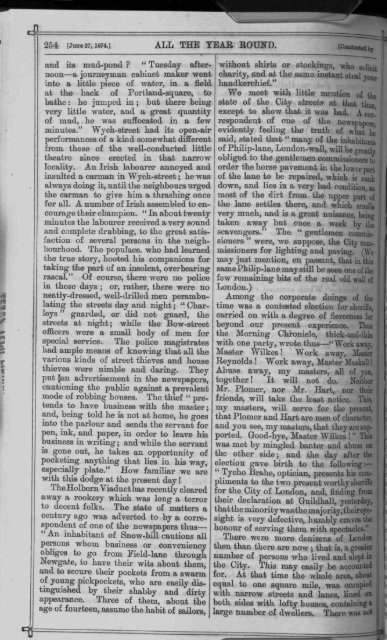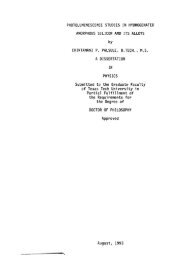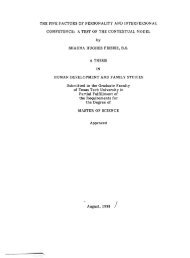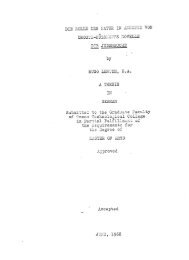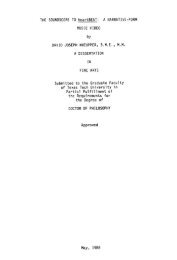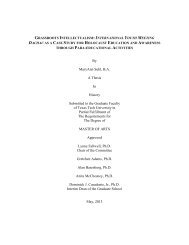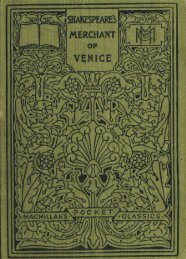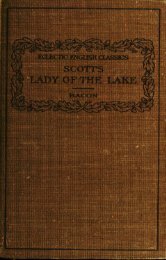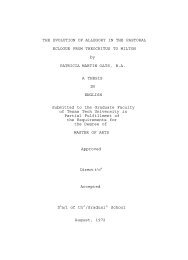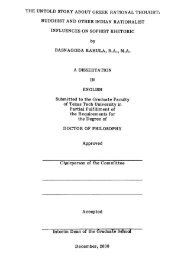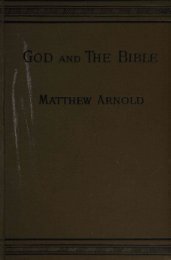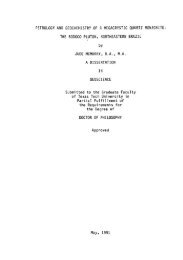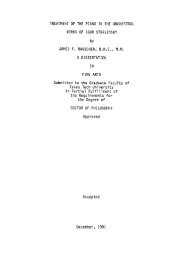A NARROW ESCAPE.
A NARROW ESCAPE.
A NARROW ESCAPE.
Create successful ePaper yourself
Turn your PDF publications into a flip-book with our unique Google optimized e-Paper software.
4<br />
^<br />
254 [June 27,1874.] ALL THB TBAB BOUND.<br />
and ite mud-pond ? " Tuesday afternoon—a<br />
ionmeyman cabinet maker went<br />
into a little piece of water, in a field<br />
at the back of Portland-square, to<br />
bathe: he jumped in ; but there being<br />
very little water, and a great quantity<br />
of mud, he was suffocated in a few<br />
minutes." Wych-street had its open-air<br />
performances of a kind somewhat different<br />
from those of the well-conducted little<br />
theatre since erected in that narrow<br />
locality. An Irish labourer annoyed and<br />
insulted a carman in Wych-street; he was<br />
always doing it, until the neighbours urged<br />
the carman to give him a thrashlDg once<br />
for all. A number of Irish assembled to encourage<br />
their champion. " In about twenty<br />
minutes the labourer received a very sound<br />
and complete drubbing, to the great satisfaction<br />
of several persons in the neighbourhood.<br />
The populace, who had learned<br />
the true story, hooted his companions for<br />
taking the part of an insolent, overbearing<br />
rascal." Of course, there were no police<br />
in those days ; or, rather, there were no<br />
neatly-dressed, well-drilled men perambulating<br />
the streets day and night; " Charleys<br />
" guarded, or did not guard, the<br />
streete at night; while the Bow-street<br />
ofScers were a small body of men for<br />
special service. The poUce magistrates<br />
had ample means of knowing that aU the<br />
various kinds of street thieves and house<br />
thieves were nimble and daring. They<br />
put [an advertisement in the newspapers,<br />
cautioning the public against a prevalent<br />
mode of robbing houses. The thief " pretends<br />
to have business with the master;<br />
and, being told he is not at home, he goes<br />
into the parlour and sends the servant for<br />
pen, ink, and paper, in order to leave his<br />
business in writing; and while the servant<br />
is gone out, he tekes an opportunity of<br />
pocketing anything that lies in his way,<br />
especially plate." How familiar we are<br />
vrith this dodge at the present day!<br />
The Holbom Viaduct has recently cleared<br />
away a rookery which was long a terror<br />
to decent folks. The stete of matters a<br />
century ago was adverted to by a correspondent<br />
of one of the newspapers thus—<br />
" An inhabitant of Snow-hill cautions all<br />
persons whom business or conveniency<br />
obliges to go from Eield-lane through<br />
Newgate, to have their wite about them,<br />
and to secure their pockefa iErom a swarm<br />
of young pickpockets, who are easily distinguished<br />
by their shabby and dirty<br />
appearance. Three of them, about the<br />
age of fourteen, assume the habit of sailors.<br />
[Caadnot«il»<br />
vrithout shirts or stockings, who solicit<br />
charity, and at the same instant steal yom<br />
handkerchief."<br />
We meet with little mention ol the<br />
state of the City sia-eets at that time<br />
except to show that it was bad. A enrespondent<br />
of one of the newspapci<br />
eridently feeling the truth of what he<br />
said, steted tlmt " many of the inhabitants<br />
of Philip-lane, London-wall, will be greatly<br />
obliged to the gentlemen commissionera to<br />
order the horse pavement in the lower part<br />
of the lane to be repaired, which is sank<br />
down, and lies in a very bad condition as<br />
most of the dirt from the upper pait of<br />
the lane settles there, and which smells<br />
very much, and is a great nuisance, benig<br />
teken away but once a week by the<br />
scavengers." The " gentlemen commissioners<br />
" were, we suppose, the City com. I<br />
missioners for lighting and paving. (We I<br />
may just mention, en paasant, that in this<br />
same Philip-lane may still be seen one of the<br />
few remaining bite of the real old wall of<br />
London.)<br />
Among the corporate doings of tLi<br />
time waa a contested election for sherifiii,<br />
carried on vrith a degree of fierceness far<br />
beyond our present experience. Thus<br />
the Moming Chronicle, thick-and-thin<br />
with one party, wrote thus—"Work awa/.<br />
Master Wilkes! Work away. Master<br />
Beynolds! Work away. Master Maskalll<br />
Abuse away, my masters, all of yoo,<br />
together! It will not do. Neither<br />
Mr. Plomer, nor Mr. Hart, nor their<br />
friends, will teke the least notice. This,<br />
my masters, wiU serve for the present,<br />
that Plomer and Hart are men of character,<br />
and yon see, my masters, that they arc supported.<br />
Good-bye, Master Wilkes !" This<br />
waa met by mingled banter and abuse on<br />
the other side; and the day after the<br />
election gave birth to the following;—<br />
" Tyoho Brahe, optician, presents his complimente<br />
to the two present worthy slierifis<br />
for the City of London, and, iinding from<br />
their declaration at Guildhall, yesterday,<br />
thatthe minority was the majority, their eyesight<br />
is very defective, humbly craves the<br />
honour of serving them with spectacles."<br />
There were more denizens of London<br />
then than there are now ; that is, a greater<br />
number of persons who lived and slept in<br />
the City. This may easily be accounted<br />
for. At that time the whole area, aboat<br />
equal to one square mile, was occnpied<br />
with narrow streets and lanes, hned on<br />
both sides vrith lofty houses, containbg ii<br />
large number of dwellers. 'There was ne!


